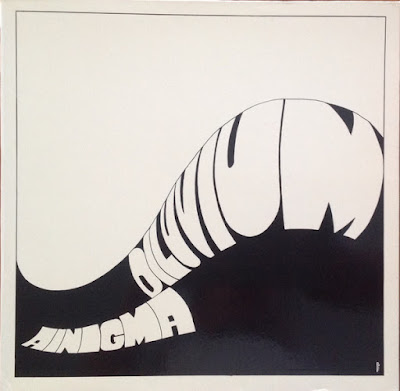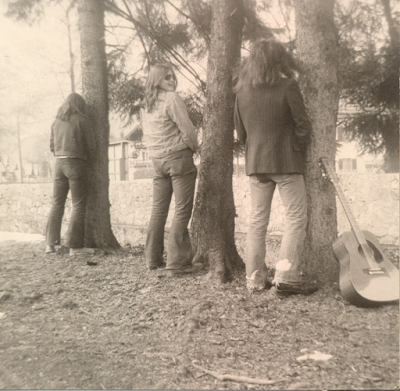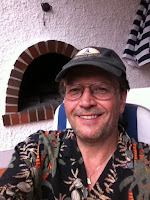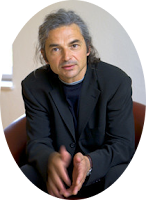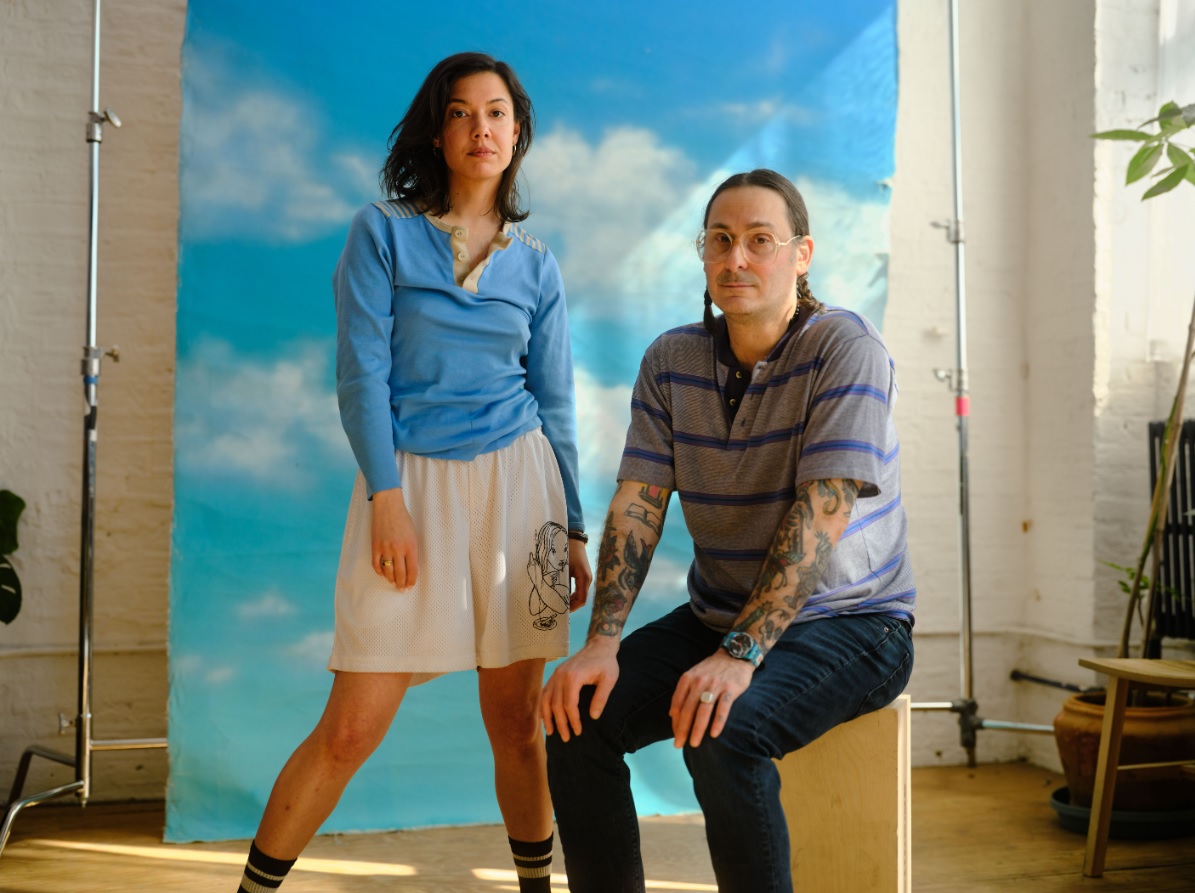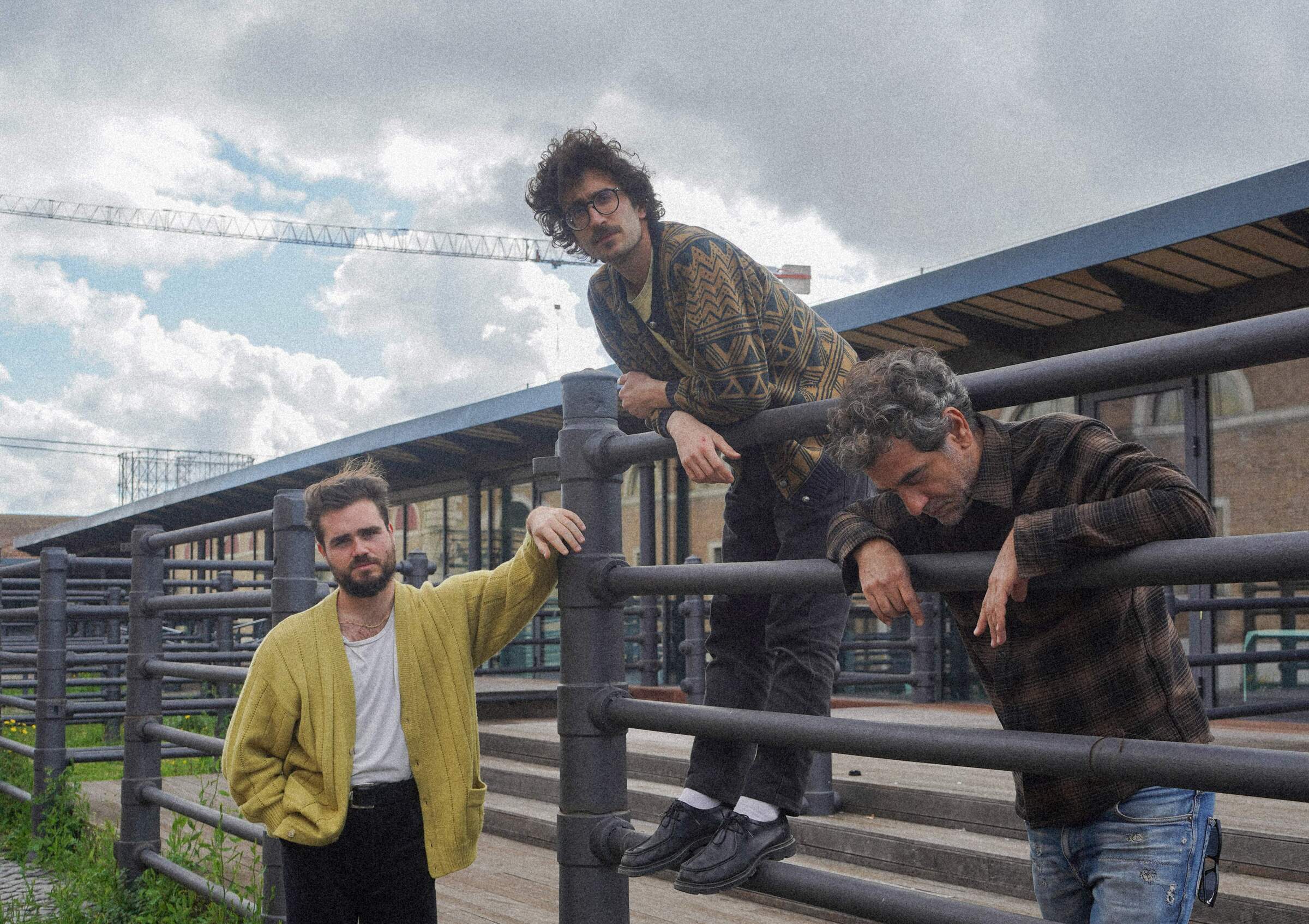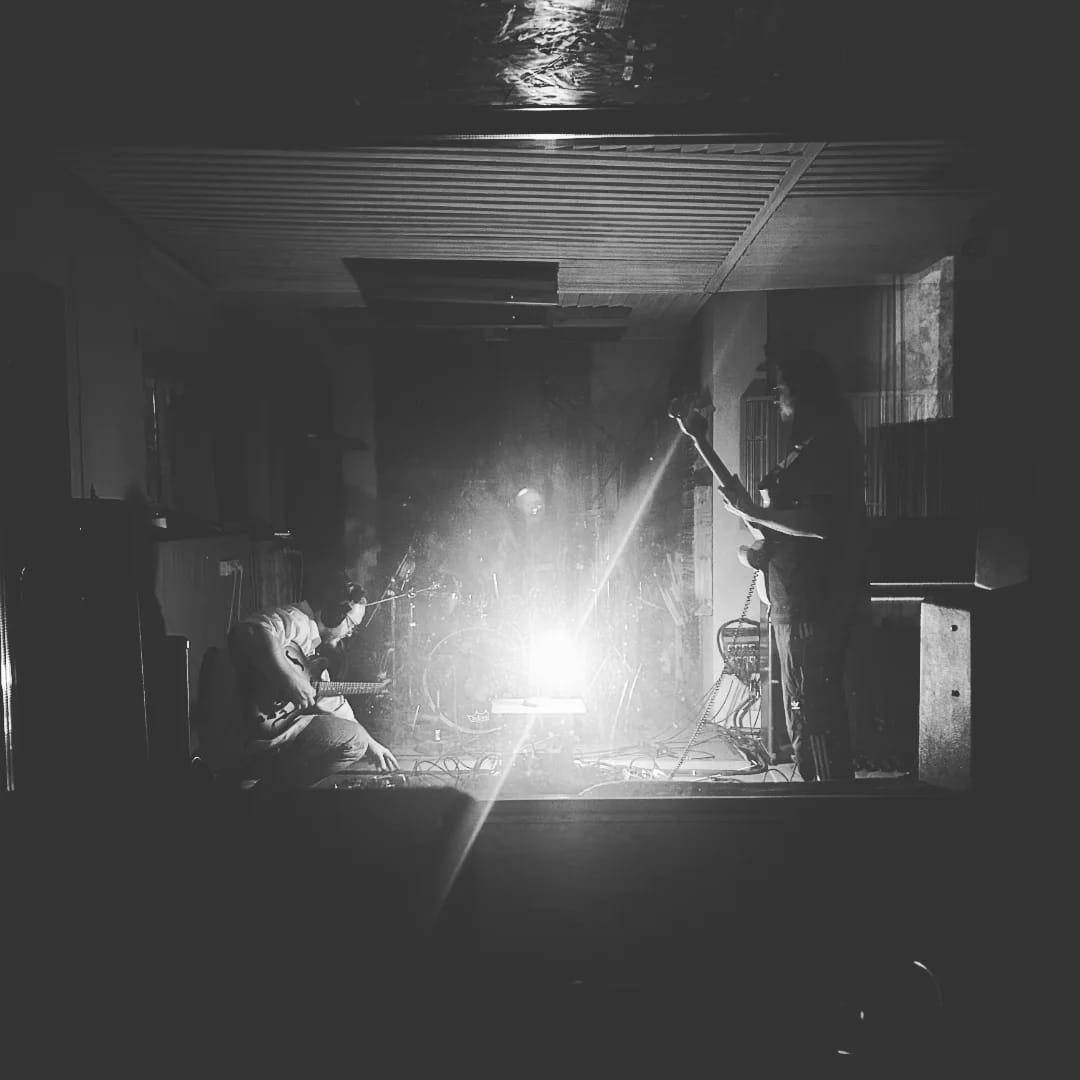Ainigma interview
The music on Diluvium was played by very young guys from Garmisch-Partenkirchen. Their album is one of the true pillars of German progressive and heavy psychedelia. It’s among the rarest. Released as a private press in 1973.
Where and when did you grow up? Was music a big part of your family life?
Willy Klüter: I was born 1955 in Garmisch-Partenkirchen, Germany, a small town in the middle of the alps, best known for winter sports, place of the Olympic games in 1936. My father was a dentist, but he played piano very good as well. I wouldn’t say that music was a big part in our family life, but it was there. My father was totally into classical music.
Wolfgang Netzer: Born 1957 in Garmisch, in my home nobody was playing any instrument even not singing. But my aunt used to play a kind of free style piano, having really fun while singing music like ‘Marina’ and other ‘hot stuff’, never reading one only note.
When did you begin playing music? What was your first instrument? Who were your major influences?
Willy: I started piano lessons when I was 7 years old, because my parents thought I should. At first it was no fun for me, I didn’t like practicing at all… The fun came later, when I was at the boarding school in Ettal with about 12/13 years, when I discovered rock ‘n’roll and started to improvise on the piano, that was my thing, not playing all that classical stuff, which I found boring. I discovered pop music, of course the Beatles, the Kinks etc.
Wolfgang: My first instrument was the violin… unfortunately just for a short period. Listening Ike & Tina Turner on the black and white TV apparatus, I’ve got a real injection of rhythm, at the same moment it opened the door of viewing a big wide world. My first albums were Beatles Revolver and Jimi Hendrix‘s Band of Gypsys. From that moment on, music became the most interesting and beautiful thing in the world.
What bands were you with prior to the formation of Ainigma?
Willy: We had a rehearsal room in that boarding school, where I was jamming with fellow students, but there was no real band.
Wolfgang: Just jamming with my turntable.
Can you elaborate on the formation of the band?
Willy: Around 1971 I started playing with my younger brother Michael in the basement of our house in Garmisch-Partenkirchen (only on school holidays, the rest of the time we were at that boarding school) with just organ and drums (Hardin & York were an early influence), mostly improvising and very loud! Some time later we became friends with guitarist Wolfgang Netzer, who was the same age as Michael, and from then on we played as a trio.
Wolfgang: We all were listening the same music! While playing my rudimentary chord , amazingly it fitted together with heavy organ sound and the drums!
When and where did Ainigma play their first gig? Do you remember the first song the band played? How was the band accepted by the audience? What sort of venues did Ainigma play early on? Where were they located?
Willy: I remember the place of our very first gig, but not the exact date. It was somewhat in 1972 at Oberammergau, which is about 20 km from our home town. We played together with ‘Taurus’, another local band. My mother drove the gear there with the family car, 3 times to the gig, and 3 times back. I can’t remember the first song we played, the reaction of the audience was OK, I think. We played at youth centres, small halls, festivals, but all located in Bavaria, south of Germany, not too far away from home. I remember one special gig in Garmisch-Partenkirchen, … we played at the ‘Pfarrsaal’, the location were we recorded Diluvium for a children carnival party. After some songs the organizer of the event came and begged us to stop, because our music would scare the children…
Wolfgang: Yes, we played in Oberammergau! Our first gig with a singer, Hans Peter, which never rehearsed with us… and never again appeared! It ended up in a kind of jam session where I was playing a bass guitar. Anyhow it really was crowded, the young people were all crazy about music. I guess, we had a good audience, anyhow it was very, very exiting.
How did you decide to use the name ‘Ainigma’?
Willy: We weren’t sure about the band name, we had some other names before, especially I remember ‘Rumzeis’, then I came up with ‘Ainigma’ which means ‘riddle’ in old Greek language. I was learning this language at school. ‘Ainigma’ sounded good, so we took that.
Wolfgang: Thanks to our humanistic education we knew, what ‘Ainigma’ means… in a moment when life felt more than enigmatic.
1971
What influenced the band’s sound?
Willy: We were influenced by all the bands we used to listen to, first of all Atomic Rooster, which were a favorite band of Michael and me, Wolfgang had LPs from Stray and Cressida, which he introduced to us, then the more popular bands like Pink Floyd, Deep Purple and Uriah Heep. We were also totally impressed by Nektar, which was the first rock concert ever that my brother and me attended in Munich.
Wolfgang: … but also Gentle Giant, King Crimson!
What’s the story behind Diluvium? Where did you record it? What kind of equipment did you use and who was the producer? How many hours did you spend in the studio?
Willy: In 1973 we had enough of our own material to fill an LP, so we decided to record. It was in the Easter holidays. There was no recording studio in Garmisch, so we found someone with mobile recording equipment. I really don’t remember why we choose the ‘Pfarrsaal’ as the recording location, which was quite big for a recording room with a lot of natural reverb, instead of doing it in our rehearsal room, which would have been a better idea maybe. In fact there was no ‘producer’. I think at that time we didn’t even know what a producer is. This guy named Franz Förth was working for the Bavarian broadcast and he came up with two Revox tape machines and a very small mixing desk, I think it had 4 channels. There were one or two microphones for the drums, one for the guitar and one for the organ. There were no effects, no compression, nothing at all. We recorded the backing tracks for all the songs on one day, the next day we recorded the vocals and Wolfgang added the bass guitar. In fact the backing tracks went from the one tape machine back into the mixer and we overdubbed the vocals and the bass at the same time, with no chance to punch in. This ‘mix’ was printed on the second tape machine and that was the final ‘master tape’.
Wolfgang: The bass sometimes is late! I can’t remember if there was at least a headphone. But I remember that I was not prepared to play the bass. From where did we get the instrument?
Please share your recollections of the sessions. What were the influences and inspirations for the songs recorded?
Willy: The word ‘Diluvium’ came to me through learning the old Latin language, it means the big flood. I took the lyrics mostly out of an old Latin bible. ‘Prejudice’ was a lyric given to us by an american friend called Harry Bowman. I don’t remember what inspired me to write “All Things Are Fading”, which is a very sad song.
Would you share your insight on the album’s tracks?
Willy: I think that we didn’t have much more of our own songs at that time than the ones on the LP. I remember another song called “Wretched Eyes”, which we didn’t record, don’t know why. So basically these four songs were all we had to offer by Easter 1973, because our live set also included several cover songs.
How pleased was the band with the sound of the album? What, if anything, would you like to have been different from the finished product?
Willy: The thing was, that we could not listen to the above mentioned ‘master tape’. The engineer had to leave very quickly after the session so there was no time. He gave us the tape and we sent it to the pressing plant, trusting that everything would be alright. Weeks later the finished LPs came and we were totally disappointed! It sounded horrible to us, very thin, and the worst were some radical volume changes, where the engineer lowered the overall volume to avoid overloads. He was totally unable to cope with that things, I mean, listen to the fade-out of All Things Are Fading”, that’s ridiculous! (On the original LP, the later versions are better, because I did some kind of re-mastering and fixed that). So if you ask, what we would have liked to be different: everything! In fact we were ashamed by the finished product. As a result we decided to sell the LP for 10 DM, which was the half of a normal price for an LP at that time, because we thought that was all it was worth. These days you can easily pay 1000 EUR for an original, so that is about 200 times that much.
Wolfgang: It was no serious work at all, especially with the sound engineer. After some weeks we got the LP which was far away from our live sound! Last but not least one could say with this recording we prepared the PUNK movement ten years before it was created. And some very crazy guys pay a lot of money to get this original recording until today!
How many copies were pressed?
500 copies
Was there a certain concept behind the album?
Not really.
What happened after the band stopped? Were you still in touch with other members?
Willy: We went different ways but kept in touch. My brother died in September 2016.
Wolfgang: Willy and me never stopped making music. However we are walking on different paths!
Is there any unreleased material?
Willy: Unfortunately no. There was a really good live tape that a friend recorded in Donauwörth, I heard it once at his home, our whole 2 hour live set! Some time later I asked him for a copy, but he had erased it, because he needed some tape… what a pity!!!
Wolfgang: After Diluvium, Willy created a very exiting new idea which was called “Journey To The Centre Of The Earth”. These were our most expressive musical years. Unfortunately we don’t have recorded material.
Willy: Yes, after reading Jules Verne’s book I wrote this 40-minutes piece, earlier than Rick Wakeman!
Almost 18 minutes track “Diluvium” is truly amazing. Would you like to share a story behind its making?
Willy: I think “In-A-Gadda-Da-Vida” by Iron Butterfly inspired us to make a long track including a drum solo.
Wolfgang: Right, “In-A-Gadda-Da-Vida”! As well as “Atom Heart Mother” and other Pink Floyd creations.
Did any member have any other musical involvements later on?
Willy: I was all of the time after Ainigma involved in music and I still am. I played with different bands and turned more and more into commercial music. I stopped playing live by the end of The 1980s. I run a recording studio and write and produce for several artists. I have released about 1000 own compositions. My brother Michael turned into blues music, playing occasionally mostly guitar and singing songs by JJ Cale.
Willy in 1974
Wolfgang: I am steadily in work with music, creating pieces for TV, cinema, theater and of course life performances with musicians from India, Brasil, Italy; Argentina, Tunisia a.o. last year touring for several gigs with Gabriele Mirabassi & Dr. Jane Goodall.
What currently occupies your life?
Willy: Music, music, music!
Wolfgang: Ditto.
Let’s end this interview with some of your favourite albums. Have you found something new lately you would like to recommend to our readers?
Willy: My musical taste has changed with the years. I’m now more into melodic stuff rather than the progressive stuff I used to listen when I was young. So your readers probably think that it’s too much mainstream what I listen to these days. Some favorites from back then, which I still own and listen to sometimes, were Death Walks Behind You from Atomic Rooster, Journey To The Centre Of The Eye by Nektar but also For Girls Who Grow Plump in the Night by Caravan among many others.
Wolfgang: Steven Stubbs Tragicomedia, Erkan Ogur (several), Guinga Cheio de dedos, Egberto Gismonti Dancas da Cabeça, Mike Dawes, Shostakowitsch and a lot of classical music and so many more.
Thank you for taking your time. Last word is yours.
Willy: Thank you for the invitation! It’s amazing that our early work still catches some people out there.
Wolfgang: Music moves the world!
– Klemen Breznikar
© Copyright http://www.psychedelicbabymag.com/2018
Array





